北师大版初中英语八年级上册词汇讲解Unit 6 The unexpected (词汇)
八年级英语上册知识讲义-Unit 6 The Unexplained lesson 17 -北师大版
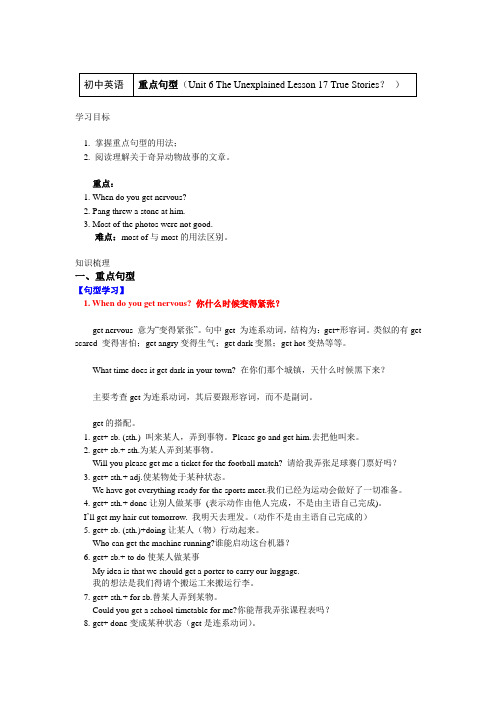
学习目标1. 掌握重点句型的用法;2. 阅读理解关于奇异动物故事的文章。
重点:1. When do you get nervous?2. Pang threw a stone at him.3. Most of the photos were not good.难点:most of与most的用法区别。
知识梳理一、重点句型【句型学习】1. When do you get nervous? 你什么时候变得紧张?get nervous 意为“变得紧张”。
句中get 为连系动词,结构为:get+形容词。
类似的有get scared 变得害怕;get angry变得生气;get dark变黑;get hot变热等等。
What time does it get dark in your town? 在你们那个城镇,天什么时候黑下来?主要考查get为连系动词,其后要跟形容词,而不是副词。
get的搭配。
1. get+ sb. (sth.) 叫来某人,弄到事物。
Please go and get him.去把他叫来。
2. get+ sb.+ sth.为某人弄到某事物。
Will you please get me a ticket for the football match? 请给我弄张足球赛门票好吗?3. get+ sth.+ adj.使某物处于某种状态。
We have got everything ready for the sports meet.我们已经为运动会做好了一切准备。
4. get+ sth.+ done让别人做某事(表示动作由他人完成,不是由主语自己完成)。
I’ll get my hair cut tomorrow. 我明天去理发。
(动作不是由主语自己完成的)5. get+ sb. (sth.)+doing让某人(物)行动起来。
Who can get the machine running?谁能启动这台机器?6. get+ sb.+ to do使某人做某事My idea is that we should get a porter to carry our luggage.我的想法是我们得请个搬运工来搬运行李。
英语北师大版八年级上册《Unit 6 The Unexplained Skills Read 》课件公开课
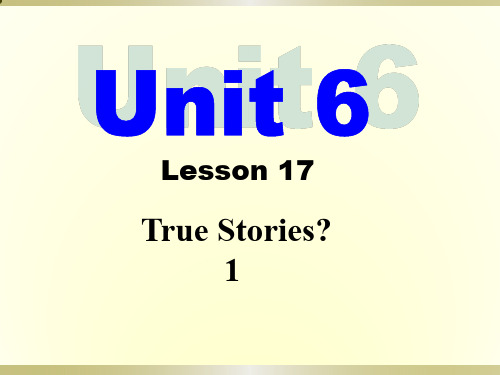
True Stories? 1
unexplained things
难以解释的
A
B
C
1. Bigfoot
主题
2. The Loch Nesshink Photo A is about the Loch Ness Monster. I don’t believe it’s real.
dark strange scary
dangerous huge strange
Adjectives: dangerous, dark, dirty, hairy, huge , large, long , scary, strange, tall
hairy large scary
Look at this picture and try to make your own story.
He took about five photos before the creature disappeared.
A Most of the photos were not good. It was hard to see
anything. However, one photo was a bit better.
Who Where and When
Pang Gensheng
In China in 1977
What was happening
What did the strange man look like? Ending
was working in….when he saw…..,got scared
Strange, tall and hairy, two meters tall with long arms, dark eyes and big teeth.
初中英语北师大版八年级上册《Unit 6 The Unexplained Communication

each piece of writing.
Answer: 1—b 2—a
Read the first passage again and answer the question.
Q: When did Bella become very sad and when was Tara so happy?
1.What was she doing in the primary school? She was talking to her friend Janet. 2.Why were they getting scared?
Because suddenly someone was running behind them.
Answer:
When Tara the elephant couldn’t see Bella, she became very sad. When someone carried Bella out, Tara was so happy.
Read the second passage again and answer the questions.
Look at the second passage and find out some of the linking words . Then, use them to connect the sentences.
then, after that, first, finally,
Last night, she had a strange dream. She was in primary school. __F_ir_st___She was talking to her friend Janet. _T_h_en__ Suddenly someone was running behind them. _Af_te_r_th_at They went to the top of the school building. _F_i_n_a_ll_y__She woke up and she was on the floor.
北师大版八年级上册英语 Unit 6 词汇和语法基础(解析版)
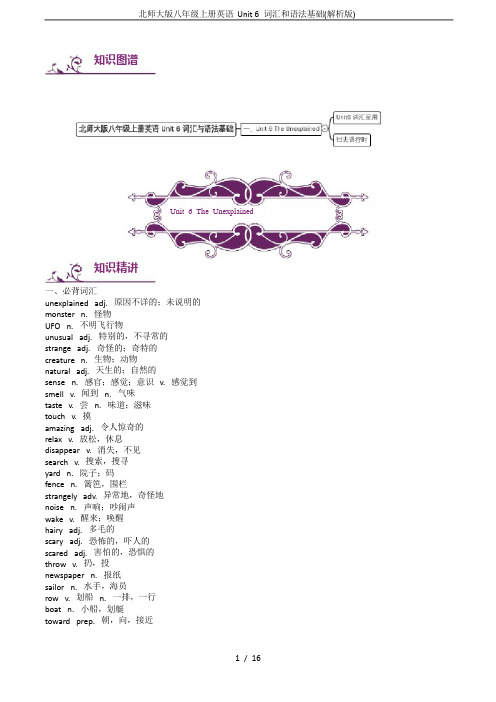
知识图谱Unit6The Unexplained知识精讲一、必背词汇unexplained adj.原因不详的;未说明的monster n.怪物UFO n.不明飞行物unusual adj.特别的,不寻常的strange adj.奇怪的;奇特的creature n.生物;动物natural adj.天生的;自然的sense n.感官;感觉;意识v.感觉到smell v.闻到n.气味taste v.尝n.味道;滋味touch v.摸amazing adj.令人惊奇的relax v.放松,休息disappear v.消失,不见search v.搜索,搜寻yard n.院子;码fence n.篱笆,围栏strangely adv.异常地,奇怪地noise n.声响;吵闹声wake v.醒来;唤醒hairy adj.多毛的scary adj.恐怖的,吓人的scared adj.害怕的,恐惧的throw v.扔,投newspaper n.报纸sailor n.水手,海员row v.划船n.一排,一行boat n.小船,划艇toward prep.朝,向,接近dive v.跳水,潜水side n.边缘;一边,一侧imaginary adj.想象中的,虚构的might v.可能;可以prove v.证明,证实brain n.脑asleep adj.睡着的probably adv.很可能human n.人common adj.普通的,常见的realise v.意识到,领会radio n.无线电广播pyjama n.睡衣裤二、重点词汇1.unexplained adjective/ʌnɪkˈspleɪnd/Unexplained events,behaviour,etc.are ones for which people do not know or understand the reason.(事件、行为等)未说明的,未解释的,原因不详的例句:He was shot dead earlier this year in unexplained circumstances.他在今年早些时候莫名其妙地被人开枪打死了。
北师大版八年级上册英语 Unit 6 词汇与语法基础(解析版)
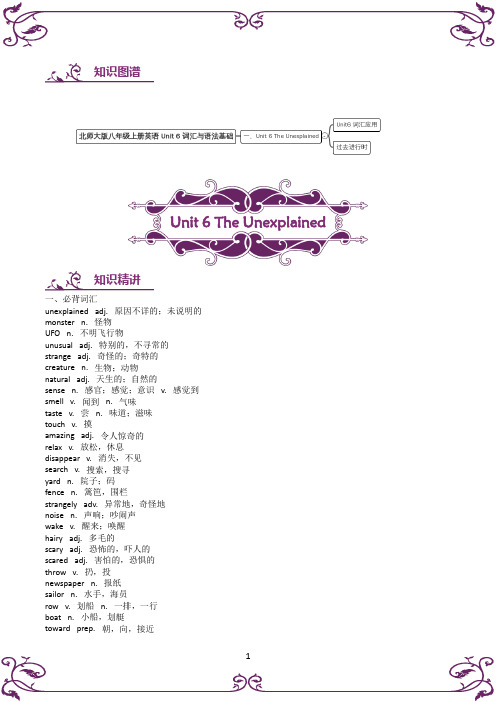
例句:
Tragedy touched their lives when their son was 16.
他们儿子16岁那年,他们的生活中发生了悲剧。
The TV report about the children's work for charity touched thousands of people's hearts.
证明,证实
例句:
Computers have been used to prove mathematical theorems.
计算机被用于证明数学定理。
That theory was proved false.
那个理论被证实是错误的。
5. sense noun /sens/
1). an ability to understand, recognize, value, or react to something, especially any of the five physical abilities to see, hear, smell, taste, and feel
你预感他们会作何反应?
The helicopters hovering overhead added to the sense of urgency.
头顶盘旋的直升机加重了紧迫感。
3). one of the possible meanings of a word or phrase含义,意义
例句:
碰,触摸
例句:
That paint is wet - don't touch (it).
那块油漆没干——别碰(它)。
He touched the girl on the arm to get her attention.
北师大版英语八年级上册Unit 6 The Unexplained重难点知识归纳总结
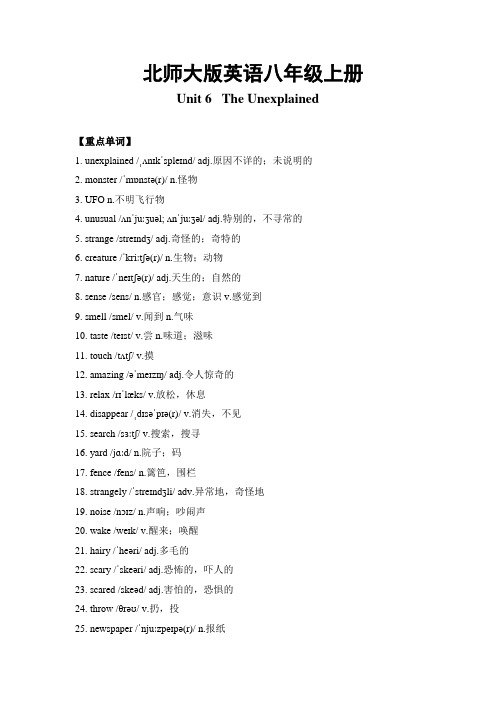
北师大版英语八年级上册Unit 6 The Unexplained【重点单词】1. unexplained /ˌʌnɪkˈspleɪnd/ adj.原因不详的;未说明的2. monster /ˈmɒnstə(r)/ n.怪物3. UFO n.不明飞行物4. unusual /ʌnˈjuːʒuəl; ʌnˈjuːʒəl/ adj.特别的,不寻常的5. strange /streɪndʒ/ adj.奇怪的;奇特的6. creature /ˈkriːtʃə(r)/ n.生物;动物7. nature /ˈneɪtʃə(r)/ adj.天生的;自然的8. sense /sens/ n.感官;感觉;意识 v.感觉到9. smell /smel/ v.闻到 n.气味10. taste /teɪst/ v.尝 n.味道;滋味11. touch /tʌtʃ/ v.摸12. amazing /əˈmeɪzɪŋ/ adj.令人惊奇的13. relax /rɪˈlæks/ v.放松,休息14. disappear /ˌdɪsəˈpɪə(r)/ v.消失,不见15. search /sɜːtʃ/ v.搜索,搜寻16. yard /jɑːd/ n.院子;码17. fence /fens/ n.篱笆,围栏18. strangely /ˈstreɪndʒli/ adv.异常地,奇怪地19. noise /nɔɪz/ n.声响;吵闹声20. wake /weɪk/ v.醒来;唤醒21. hairy /ˈheəri/ adj.多毛的22. scary /ˈskeəri/ adj.恐怖的,吓人的23. scared /skeəd/ adj.害怕的,恐惧的24. throw /θrəʊ/ v.扔,投25. newspaper /ˈnjuːzpeɪpə(r)/ n.报纸26. sailor /ˈseɪlə(r)/ n.水手,海员27. row /rəʊ/ v.划船 n.一排,一行28. boat /bəʊt/ n.小船,划艇29. toward /tə'wɔːd/ prep.朝,向,接近30. dive /daɪv/ v.跳水,潜水31. side /saɪd/ n.边缘;一边,一侧32. imaginary /ɪˈmædʒɪnəri/ adj.想象中的,虚构的33. might /maɪt/ v.可能;可以34. prove /pruːv/ v.证明,证实35. brain /breɪn/ n.脑36. asleep /əˈsliːp/ adj.睡着的37. probably /ˈprɒbəbli/ adv.很可能38. human /ˈhjuːmən/ n.人39. common /ˈkɒmən/ adj.普通的,常见的40. realise /'rɪəlaɪz/ v.意识到,领会41. radio /ˈreɪdiəʊ/ n.无线电广播42. pyjama /pəˈdʒɑːmə/ m.睡衣裤【重点短语】1. right now 现在;立刻,马上2. in fact 事实上,实际上3. wake up 叫醒;醒来4. take sb for a walk 带某人去散步5. search for 寻找6. run around 东跑西跑7. walk away 走开8. on holiday 在度假9. take out 拿出来10. come up 上升,发生,开始11. ride a bicycle 骑自行车12. dream about 梦想,梦到13. right now /at once 马上14. fly over 飞过15. make friends with 和……交朋友16. wait for 等待17. run after 追逐,追赶18. forget to do sth 忘记要去做某事19. be mixed up 混杂,搞混,弄糊涂20. go away 走开,离开21. arrive at 到达22. again and again 再三地,反复地【重点句型】1. You can see, smell, taste and feel cheese but you can’t hear it!你可以看、闻、尝和感觉奶酪,但你却听不到它!2. —Were they doing their homework when I went shopping?我去购物的时候他们在做作业吗?—Yes, they were.是的,他们在。
北师大版八年级英语上册知识讲义-重点短语(Unit 6 The Unexplained

学习目标掌握重点短语的用法。
重点:dream about ; in pyjamas ; in fact ; right now ; again and again难点:dream作及物动词和不及物动词的用法;dress的用法。
知识梳理【短语学习】1. dream about 梦见dream about 意为“梦见”,与dream of同义,其后可跟名词、代词或动词-ing形式。
此处dream作动词,意为“做梦”,其过去式、过去分词均为:dreamed或dreamt。
The boy dreamt about / of his grandfather last night. 这个男孩昨晚梦见他爷爷了。
常考查dream用作不及物动词,后接about或of,再接宾语。
I used to dream ____________ it when I was a boy.A. aboutB. withC. forD. on答案:A思路分析:题意:当我还是孩子的时候就梦到了它。
dream about sb. 梦到某人。
故选A。
2. in pyjamas 穿着睡衣in pyjamas 中in为介词,意为“穿戴(衣服等)”,表示状态。
She is in a red coat. 她穿着一件红色的外套。
考查“穿”的不同表示方法,如:in, dress, put on, wear等。
The girl in red is my sister. 穿着红衣服的女孩是我姐姐。
He is wearing jeans today. 他今天穿着牛仔裤。
Put on your coat. It is too cold outside. 穿上你的外套。
外面太冷。
The boy is too young to dress himself. 这个男孩太小了,不会自己穿衣服。
助记:“穿戴”动作put on,状态wear已穿上。
穿鞋袜,着服装,眼镜、手套、帽戴上。
北师大版八年级英语上册课件:Unit 6 The Unexplained
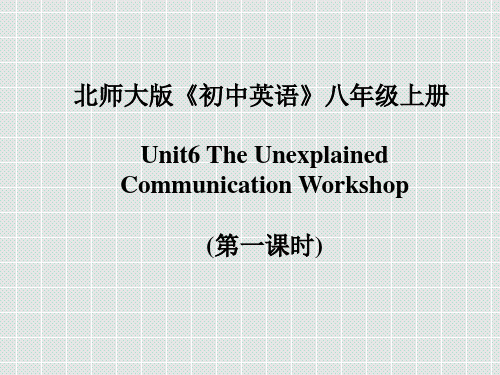
Unit6 The Unexplained Communication Workshop
(第一课时)
Do you know some unusual stories about animals? Talk one with your partner.
Think of a strange dream of yours. What happened in the dream?
1.What was she doing in the primary school? She was talking to her friend Janet. 2.Why were they getting scared?
Because suddenly someone was running behind them.
Homework:
Finish the composition if they can’t finish it in class. If someone has finished it, check and correct it.
Read and match the titles to each piece of writing.
Answer: 1 —b 2 —a
Read the first passage again and answer the question.
Q: When did Bella become very sad and when was Tara so happy?
Look at the second passage and find out some of the linking words . Then, use them to connect the sentences.
- 1、下载文档前请自行甄别文档内容的完整性,平台不提供额外的编辑、内容补充、找答案等附加服务。
- 2、"仅部分预览"的文档,不可在线预览部分如存在完整性等问题,可反馈申请退款(可完整预览的文档不适用该条件!)。
- 3、如文档侵犯您的权益,请联系客服反馈,我们会尽快为您处理(人工客服工作时间:9:00-18:30)。
Unit 6 The Unexplained词汇精讲精练:词汇精讲1. smell(1)smell作实义动词,意为“闻”。
例如:Please smell the soup! 请闻闻这汤!(2)smell作系动词,意为“闻起来”,后接形容词作表语。
例如:Dinner smells good. 晚饭闻起来很香。
【拓展】类似smell作系动词的词还有:look(看上去);feel(感觉起来、摸上去);sound(听起来);taste(品尝)等。
例如:The music sounds beautiful. 这首音乐听起来很美。
The food tastes good. 食物尝上去很香。
注意:smell; look等系动词不同于系动词be,它们在变疑问句或否定句时不能简单地提到主语之前或加not,而是要通过助动词do/does/ did等来帮助实现。
例如:Does it smell nice? 它闻起来很好吗?The chicken doesn’t taste good. 鸡肉尝起来不好。
How do the children look? 孩子们看起来怎么样?2. taste(1)taste作及物动词,意为“尝,尝出”,后常接表示物品的名词或代词作宾语。
例如:He tasted the bread. 他尝了尝这面包。
Can you taste the mutton in the soup? 你能尝出汤里的羊肉味吗?(2)taste作连系动词,意为“尝起来”,后接形容词作表语。
例如:The food tastes good. 这食物尝起来很好。
(3)taste作名词,意为“味道,滋味”。
例如:I don’t like the taste of the cheese. 我不喜欢这奶酪的味道。
3. searchsearch作不及物动词,意为“搜索,搜寻”。
search for意为“搜寻,找寻”,其后跟被搜寻的人或物。
例如:It was too dark to search further. 天太黑了,无法继续搜寻。
They searched for the little boy in the forest. 他们在森林中搜寻那个小男孩。
【拓展】search作及物动词,意为“搜查,在……中搜索”。
search…for sb./sth.意为“搜查……”。
例如:He searched every room in the house. 他搜查了这房子里的每一个房间。
4. noisynoisy作形容词,意为“吵闹的;嘈杂的;喧闹的”。
例如:I t’s a noisy place, I can hardly hear you. 这是一个吵闹的场所,我几乎听不到你(说什么)。
【拓展】(1)noise作名词,意为“噪音;喧闹声”。
例如:I don’t like so much noise. 我不喜欢这么吵闹。
(2)noisily作副词,意为“吵闹地”,多用来修饰实义动词。
例如:The little boy is crying noisily in the living room. 那个小男孩正在起居室里大哭。
5. scaredscared作形容词,意为“惊慌的,吓坏了的”,相当于afraid。
常用短语:be scared of意为“害怕……”,be scared to do sth意为“害怕做某事”。
例如:He was scared of snakes. 他害怕蛇。
【拓展】辨析:scared, scare与scary6. hairyhairy作形容词,意为“多毛的,长毛的”,由名词hair(头发)加后缀-y构成。
其反义词是hairless,意为“无毛的”。
例如:A mammoth is a large hairy type of elephant in ancient times.猛犸是古代一种身体庞大、全身长毛的大象。
【拓展】“名词+y”构成的形容词还有:health(健康)—healthy(健康的)rain(雨)—rainy(下雨的)wind (风)—windy(有风的)snow(雪)—snowy(多雪的)cloud (云)—cloudy(多云的)dirt(污垢)—dirty(肮脏的)7. towardtoward作介词,意为“朝,向”,主要用于美式英语中,英式英语中常用towards。
例如:She was walking toward town when I met her. 我遇到她时,她正在往城镇那边走。
注意:toward只表示朝着目的地移动,而to则含有到达的意思。
例如:After a while, all the people all go toward to see here. 在一会儿之后,所有的人全部去向在这里见面。
8. commoncommon作形容词,意为“普通的,常见的”。
例如:I t’s a common plant. 这是一种常见的植物。
【拓展】have…in common意为“有……共同之处”。
例如:He has nothing in common with his father. 他和他父亲没有共同之处。
9. realiserealise作及物动词,意为“意识到,认识到”,其后可接名词、代词或从句。
例如:Did you realise your mistake? 你意识到你的错误吗?注意:realise是英式用语,美式用语中常用realize。
【拓展】realise作动词,意为“实现(梦想、希望)”,相当于achieve。
例如:I think I can realise my dream some day. 我认为总有一天我会实现我的梦想。
10. rest(1)rest作不及物动词,意为“休息”;rest作及物动词时,意为“使休息”。
例如:He lies down and rests for an hour after lunch every day. 他每天午饭后躺下休息一小时。
(2)rest作名词,意为“休息”。
常用词组take/have a rest,意为“休息一会儿;休息一下”。
例如:You must take/have a rest from your work. 你必须放下工作休息一下。
(3)rest作名词,还可意为“其余的人;剩余部分”。
例如:The rest of the eggs are bed. 其余的鸡蛋是坏的。
11. recordrecord作名词,意为“记录”,常用词组有:break a record意为“打破记录”,keep a record意为“保持记录”,set a record意为“创造记录”。
例如:He did very well, but failed to break the record. 他做得很出色,但未破记录。
【拓展】(1)record作名词,意为“记录,记载,唱片”。
例如:He made his first record. 他制作了他的第一张唱片。
(2)record作动词,意为“记录,录制,录(音),录(影)”。
例如:I recorded the score in a notebook. 我在笔记本上记下了分数。
12. silentlysilently作副词,意为“默默地,安静地”。
其形容词形式为silent,意为“沉默的,安静的”。
名词形式为silence。
意为“沉默”。
例如:He didn’t shout. He just glared at me silently.他没有喊叫,只是默默地怒视着我。
词汇精练I. 根据句意及首字母提示完成单词。
1. There is a s of fried chicken in this room. I like it for lunch.2. Mrs. Smith often s for some information about children education on the Internet.3. The beautiful scene of that mountain village will probably d forever because of pollution.4. Tomorrow is Sunday. Don’t w me up too early.5. Waste pa per shouldn’t be t everywhere. It’s our duty to keep our city clean.6. I was so tired that I fell a soon.7. The news was p (most likely) true.8. Do you r that you’re an hour late?9. Don’t make any n . They are having a meeting.10. I want to r at home this Sunday. I’m tired.1. Stay away from it. That animal is .2. Turn on the light. It’s here.3. Look at his big shoes. That man has feet.4. Is it cat or rabbit? I don’t know. That animal looks .5. You can’t see its eyes. The dog is so .III. 用所给词的适当形式填空。
1. There are many (explain) things in the world.2. Who do you think will (win)?3. We feel (relax) after a (relax)vacation.4. The house was (strange) quiet.5. It’s a (noise) place. I can’t hear anything.6. They got (scare) when they saw something strange in the forest.7. It’s (danger) for children to go out by themselves.8. He was making some noises as he (slow) walked away.9. He threw a stone at the strange man, and he (hurt).10.—Did you hear anything (usual) in the next door?—No, I was chatting online with friends.V.听力链接。
